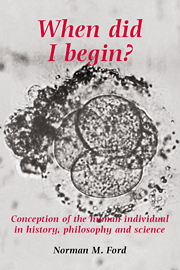Book contents
- Frontmatter
- Contents
- Foreword
- Preface
- 1 Introduction
- 2 Historical influence of Aristotle on the theory of human reproduction
- 3 Criteria for being a human individual
- 4 Fertilization and the beginning of a human individual
- 5 Implantation and the beginning of the human individual
- 6 The human individual begins after implantation
- Appendixes
- Notes
- Glossary
- Index
2 - Historical influence of Aristotle on the theory of human reproduction
Published online by Cambridge University Press: 03 February 2010
- Frontmatter
- Contents
- Foreword
- Preface
- 1 Introduction
- 2 Historical influence of Aristotle on the theory of human reproduction
- 3 Criteria for being a human individual
- 4 Fertilization and the beginning of a human individual
- 5 Implantation and the beginning of the human individual
- 6 The human individual begins after implantation
- Appendixes
- Notes
- Glossary
- Index
Summary
Why a return to Aristotle?
Aristotle was not only the greatest Greek biologist and philosopher, but also the most influential in our Western civilization. For about two thousand years, since his death in 322 B.C., his teachings have formed our traditional understanding of the origin of the individual human being. From the middle of the seventeenth century his views had been on the decline. Recently, however, there has been a revival of his theory in favour of delaying the origin of the individual human being for some weeks after conception.
This is a welcome revival for a variety of reasons. Aristotle knew how to harmonize his vast empirical observations, acquired as a naturalist and biologist, with the requirements of a philosophical interpretation of the same. There is no opposition between the facts as they were known in his day and his metaphysical categories and principles. His philosophy represents one of the best examples of common-sense realism. He did not merely observe developing parts and organs in a living creature – he interpreted them philosophically as parts and organs of one developing living being. Children know that an arm is not a leg. They also know that both an arm and a leg are equally parts of the one developing individual being. The viewpoints of biology, philosophy and ordinary experience are quite compatible – they should be seen as mutually complementing each other. Not every kind of philosophy is capable of succeeding here. The Aristotelian philosophical conceptual framework facilitates the formation of an integrated perspective.
Scientists have learnt from history to appreciate the evolutionary model of thinking for their own disciplines, society and the world at large.
- Type
- Chapter
- Information
- When Did I Begin?Conception of the Human Individual in History, Philosophy and Science, pp. 19 - 64Publisher: Cambridge University PressPrint publication year: 1988



